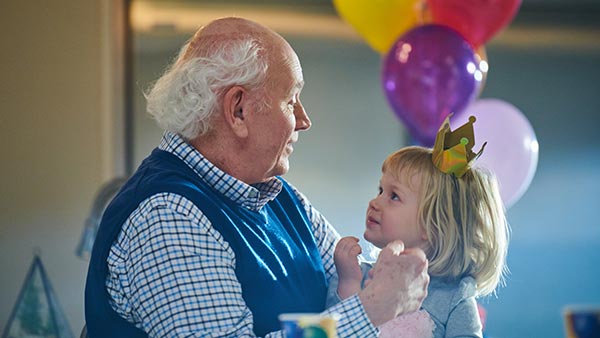
When Larry Carlson first came to UT Southwestern in 2014, he was battling an aggressive form of kidney cancer. Most patients are diagnosed while the cancer is confined to the kidney, but Larry’s cancer had invaded beyond the kidney into the pancreas and had metastasized to the liver.
A complex surgery by Drs. Margulis and Yopp in January 2015 removed all traces of the cancer, but required removal not only of the kidney with the tumor, but also part of the pancreas, the spleen, and part of the liver. Unfortunately, a few months later, lung metastases developed. Larry started pazopanib, a medication that blocks cancer cells from accessing nutrients and oxygen by targeting blood vessels. Less than a year later, however, his kidney cancer had progressed.
It was time for a deeper discussion about how to care for Larry long-term. The discussion centered on how Larry’s own immune system may be used to stop the cancer in its tracks.
The winning combination: immunotherapy and radiation
Larry enrolled in a clinical trial called RADVAX that combined two treatment approaches. The first was a powerful drug combination (ipilimumab/nivolumab), which promotes killing of cancer cells by immune system cells. This process of enhancing and arming a patient’s immune system is called immunotherapy. The immunotherapy process leverages research by Bruce Beutler, M.D., whose work at the Center for the Genetics of Host Defense led to the discovery of cell receptors that allow mammals to sense infections when they occur. He earned the 2011 Nobel Prize in Physiology or Medicine for his work.
The second approach was stereotactic ablative radiotherapy (SABR), which is focused radiation applied directly to one metastasis. SABR kills tumor cells at one site, making them more recognizable by the immune system.
This one-two punch might be more effective than conventional immunotherapy because it activates the two arms of the immune system, the so called innate and adaptive arms. Typical kidney cancer immunotherapy approaches focus on the adaptive immune system, which is so named because it changes and refines itself according to the trigger. However, by simultaneously activating the innate immune system, a more powerful immune response against the cancer might be mounted.
Shortly after the treatment commenced, Larry’s tumors began to shrink. The response is ongoing nearly a year later. Presently, Larry receives biweekly infusions of the immunotherapy drug nivolumab.
Larry enrolled in a clinical trial called RADVAX that combined two treatment approaches.
Kidney cancer innovations start here
The RADVAX trial, led by Hans Hammers, M.D., Ph.D., Co-Leader for Clinical Research of the UT Southwestern Kidney Cancer Program, is an example of a wider strategy that our investigators have adopted. This is the second trial at the Kidney Cancer Program that combines SABR and immunotherapy. The first, the iSABR trial led by Raquibul Hannan, M.D., Ph.D., Co-Leader for Radiation Oncology, evaluated the combination of IL2 with SABR. The trial enrolled 30 participants, and while the data are being analyzed, the results appear quite promising. In addition to SABR in combination with immunotherapy, UT Southwestern investigators are using SABR in multiple ways.
For Larry, this was a win. However, patients like Larry who survive aggressive kidney cancer often experience emotional highs and lows during treatment and recovery, particularly when they witness other patients who may not be faring as well. In an effort to give back and help other patients, Larry has begun training to become a volunteer in our clinic.
Are you undergoing kidney cancer treatment? Watch informational videos and learn more about the SABR and immunotherapy research conducted in our Comprehensive Kidney Cancer Program.

Larry's story: Fighting cancer two ways
Read how Larry’s therapy lets him make more happy memories.

Harold C. Simmons Comprehensive Cancer Center
Cancer Care at the Highest Level. Anywhere.
Our team of hundreds of leading cancer physicians and oncology-trained support staff is a trusted partner in returning patients with cancer to good health.

By supporting UT Southwestern Medical Center with a gift of any size, you can advance health care discovery, healing, and education. Generous donors like you make the future of medicine possible!

We’re one of the world’s top academic medical centers, with a unique legacy of innovation in patient care and scientific discovery.












